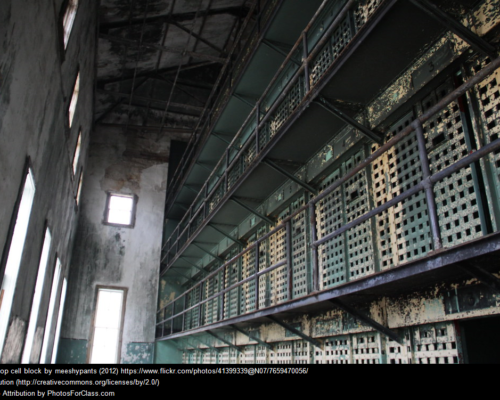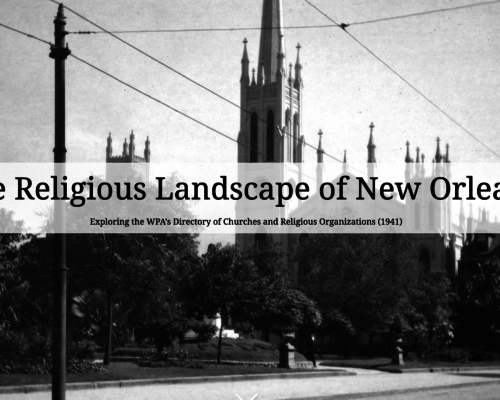This resource is designed to help researchers and students find information and resources related to digital humanities and incarcerated people Below, you will find a curated catalog of DH projects created for, by, or about the incarcerated population. To view each project, click on it’s title. Discussion Problem Prior to the 1994 Crime Bill, state and federal grants made art…
The Religious Landscape of New Orleans: Exploring the WPA’s Directory of Churches and Religious Organizations (1941)
Introduction Religion has played a prominent role in New Orleans life and culture since its French and Spanish colonial beginnings. Today, the city is home to a wide array of religious denominations including Catholicism, Judaism, and various forms of Protestantism. Each of these groups has a rich and interesting history. These histories, in turn, are interwoven with each other across…
Mapping Relationships in the Mississippi Freedom Struggle
In this project, I attempted to build on a database I made of organizers, organizations, and campaigns that were part of the Mississippi Freedom Struggle. The information in the original database was found Akinyele Umoja’s in We Will Shoot Back, a history focused on the role of armed resistance and armed self-defense in the Mississippi Freedom Struggle.[1] This text is…
Event Review: What Can You Do with a Digitized Book? DH Methods for Analyzing Printed Materials with Anne Donlon at Pratt Institute
Event Summary: On December 4th, Anne Donlon gave a lecture on current DH methods for print text analysis at Pratt Institute School of Information. This lecture gave participants an introduction to ways that large-scale book digitization projects have changed how scholars can access and analyze printed materials. Donlon gave a thorough overview of current digital humanities methods used to analyze…
Skillshare: Approach and Introduction to Python
[iframe src=”https://www.youtube.com/embed/smfueXrOHhY” width=”560″ height=”315″] The video above serves as a personable introduction to the coding language python which will be elaborated on below. This serves and a basic introduction to python, the coding language. Python is a great source tool for the someone not specifically code-literate to analyze data. It works especially well with many file formats which you…
Event Review: Open Access Symposium 2017 “Open In Order To…”
October 27, 2017 What is it? Stony Brook Open Access Symposium is an annual event to promote Stony Brook University’s Open Access materials, and publishing. It is also an opportunity to highlight the effort from the SUNY system- (State University of New York) to become more open friendly in the fields of specifically research and education tools. The…
Event Review: Queer Digital Humanities, College of William and Mary
This event was the opening panel at the Race, Memory, and Digital Humanities Conference. The panel was hosted by the College of William and Mary, and the speakers were Alexis Lothian, Leisa Meyer, and Amanda Philips. The panel started with a twenty minute slideshow presentation by Meyer on her work with the LGBTIQ Research Project, and was followed by a…
Event Review: Standardizing Museum Provenance for the Twenty-First Century
[youtube https://www.youtube.com/watch?v=YKJqINwZ–o?ecver=1] “Standardizing Museum Provenance for the Twenty-First Century” was a lecture that took place at the Yale Center for British Art on February 27th in New Haven, Connecticut. The lecture was centered on the Carnegie Museum of Art’s (CMOA) NEA-funded Art Tracks project. Art Tracks is a digital provenance project that “turn[s] provenance in to structured data by building…
EVENT REVIEW: “Digital Humanities Meets Art Galleries” at NYU Center for Humanities
The “Digital Humanities Meets Art Galleries” panel at the NYU Center For Humanities brought forth five NYU faculty for four presentations about separate ongoing digital projects that highlight the school’s work in the DH field. The presentations touched on topics spanning algorithmic data visualization of painting canvases, digital collection management, database building, and DH pedagogy among others. This post discusses in detail the contents of each presentation, what each presentation revealed about how NYU has positioned DH within its broader curriculum, and the ongoing conversation about not only what DH projects look like but also what DH essentially is.

